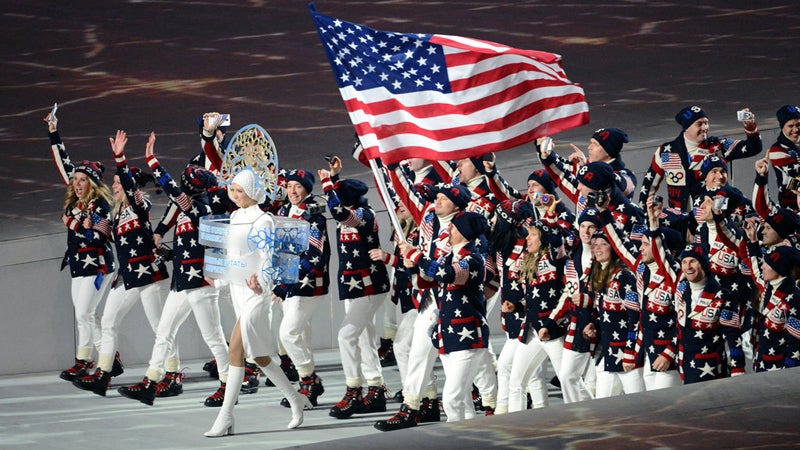Every two years, when the Olympics roll around, I always have the same reaction. In my excitement, I forget the naysayers who’ve predicted the stadiums and venues won’t be ready. I tune out the terrible weather and terrorist threats, and the broadcasters lamenting empty seats. I forgive the crass manipulation of athletics for primetime television, and the network’s tacky editing that cuts out the first two minutes of the women’s giant slalom and two-man bobsled races as though they never happened. I fret about spoilers and tear up over the thanks-mom commercials. I’m the sucker who still loves the cheesy vignettes, the grainy video footage of tiny ice dancers who grow up to be Olympic champions.
Study after study shows that children are happier, healthier, and more successful in school and life when they're active, but competition at a young age comes at a cost.
Every night for two weeks, I’m glued to the television. But when I’m not, all I want is to be outside, running faster and pushing myself to the edge of what’s possible. I’m older than the oldest competitor in Sochi, and yet, winter or summer, the Games always inspire me to be a better, stronger, smarter athlete.
The Sochi Games are the first Olympics that my children are watching, too. At three and five, my daughters are vigilant, obsessive fans. At first, I thought it was the novelty of television. We have one but rarely turn it on. But now, a week in, they’re legitimately hooked. Their love of winter sports knows no bounds: They’re savvy about skeleton and captivated by ice dancing, and they go wild for sibling athletes, most notably the trio of mogul sisters from Montreal. Three-year-old Maisy is partial to events with big air and amplitude, preferably on one board, not two; when the men’s Super G ski racing came on, she asked imploringly, “When are they going to do�����dz���ٳԲ�?”
A part of me worries about their rabid TV consumption and the habits they might be forming by sitting screen-side for 30 to 60 minutes a night. A small part of me. The fact is, watching the Olympics inspires them, too. They buzz with plans: They want to learn to play hockey and learn to carve racing turns in the snow; they want ski poles and a snowboard. They want to jump. I can almost see their spongey little brains absorbing the life lessons of competitive athletics, playing out nightly on tape-delay from Russia: Fall and get up. Make a mistake, and keep trying. Stay focused, keep your composure. Stick with your sisters. Keep going, keep trying.
Yet for all of the heartening displays of sportsmanship coming out of Sochi, I still have mixed feelings about competitive sports, both for my daughters and myself. I hope they become competent, confident, well-rounded outdoor athletes. I want them to love the outdoors as I do, and feel the pleasure that comes from moving their bodies in nature. But they’re far too young to start specializing, as more and more young children are urged to do these days. My Facebook feed is deluged by updates from friends whose kindergarteners have a busier race schedule than most adults: mountain biking, cross-country skiing, BMX. It’s hard not to get a complex from the steady stream of slalom results trickling in from the junior circuit in Vermont or Colorado.
Study after study shows that children are happier, healthier, and more successful in school and life when they’re active, but competition at a young age comes at a cost: weekends spent on the soccer circuit, driving around the state to swim meets. The Welsch sisters, a pair of young running phenoms from Texas, travel to triathlons and trail races at least once, if not twice, a week. My older daughter is only in kindergarten, but already we’re trying to juggle homework and after-school activities. Time crunch aside, the greater risk is that children become so preoccupied with winning that they lose sight of the larger joy of why we move and play in the first place: to feel strong and free and alive in our bodies.
So what is the right age for kids to begin competing? The answer is different for every child, and every family. Eighteen-year-old alpine skier Mikaela Shiffrin, who notched an impressive fifth-place finish in her Olympic debut at the giant slalom earlier this week, started skiing when she was three and was racing gates by seven; at 11 she went off to a ski academy. Still, her parents were determined to keep her race schedule light and her home life, if not exactly normal, then at least diversified. She and her older brother, a college ski racer, played soccer and cross-trained by doing chores in the yard. When Mikaela began competing on the World Cup at 15, her mother traveled with her to all her races.
Charlie White, half of the gold-medal ice dancing duo, grew up playing ice hockey and skating. In one of NBC’s many vignettes about the pair, a school-age White, decked out in full hockey regalia, was asked which he liked better. “Neither,” he replied. “I guess I like whatever sport I’m doing when I’m doing it.” For a little while at least, he was just a regular kid who loved the ice. When he began to compete, his mother, like Mikaela’s, accompanied him to every event.
It’s a familiar story: The Lafour-Dupointe sisters from Montreal grew up racing moguls from a young age. But their parents, too, insisted that family came first, competitive skiing second. Strong families build balanced athletes.
Parenting is deeply personal, but it’s also increasingly competitive, and it can be hard not to get sucked into what other children are doing, how other parents are parenting. Is my kid fast enough, smart enough, good enough? These comparisons, of course, disguise a deeper, thinly-veiled worry: Am I? The ultimate gift, and biggest challenge, might be to let go of our own expectations, ego, and competitive drive and follow our children’s lead, wherever that may lead us.
Part of the appeal of the Olympics is that they mark time, delivering a biannual dose of nostalgia that’s both personal and universal. At nine, I lay on my grandparents’ shag carpet in Pennsylvania, with my feet pressed up against an electric space heater, and watched the U.S. hockey team beat the USSR in Lake Placid. Nearly 30 years later, my husband and I tuned into the 2008 Beijing Summer Games from an island in Ontario, one-month old Pippa swaddled and snoozing in the laundry basket that doubled as her crib. In 2010, during the Vancouver Winter Games, Maisy hadn’t been born and my father was still alive. Two summers ago, three-year-old Pippa was jumping off our island dock into deep water while American swimmers raced to victory in London.
What will my daughters be doing in 2016? 2020? Maybe they’ll be competitive skiers or swimmers or runners; maybe they’ll play the banjo or write stories. It’s impossible to know, and almost heartbreaking to imagine them grown. I’m perfectly content to just wait and see.
But for now, ice hockey’s on, and the girls want to skate.


